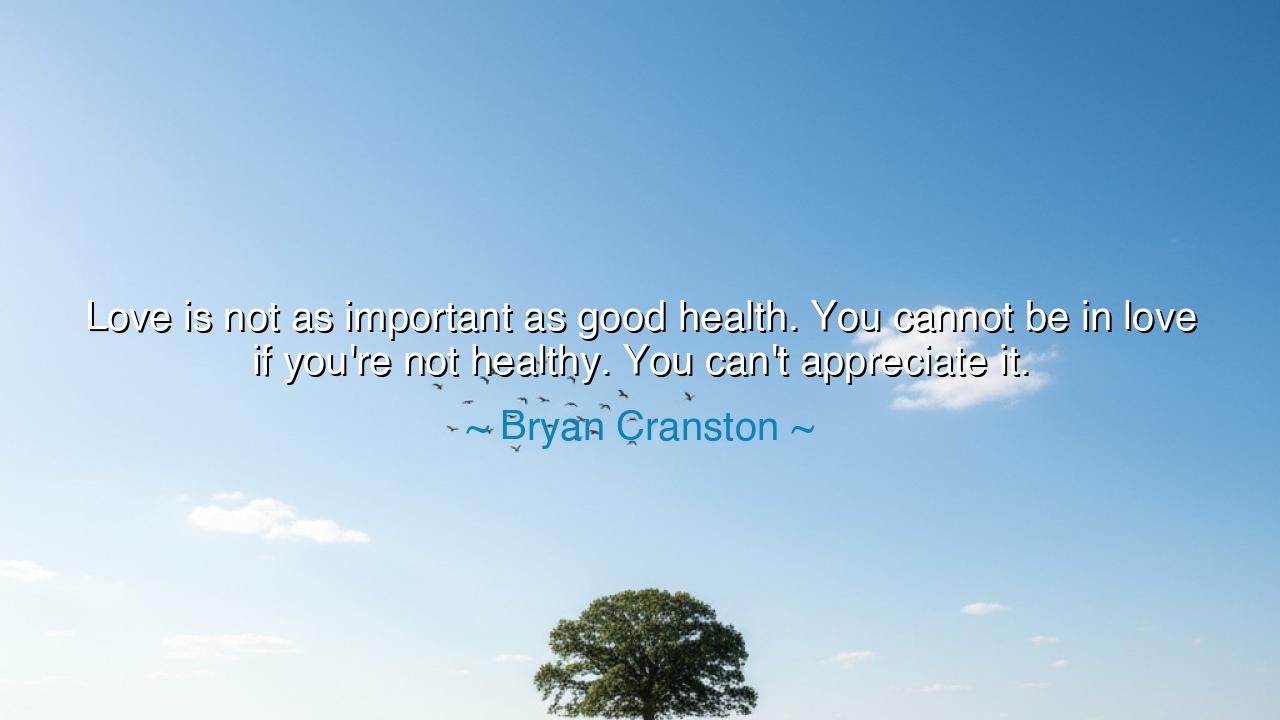
Love is not as important as good health. You cannot be in love if
Love is not as important as good health. You cannot be in love if you're not healthy. You can't appreciate it.






In the contemplative and grounded words of Bryan Cranston, we encounter a truth both humbling and profound: “Love is not as important as good health. You cannot be in love if you're not healthy. You can't appreciate it.” At first, these words may seem stark, almost contrary to the romantic ideals sung by poets and dreamers throughout the ages. Yet when examined closely, they reveal a deeper wisdom — that love, as radiant as it is, cannot flourish in the shadow of sickness, pain, or neglect. Cranston, known for his mastery of roles that explore the fragility of the human condition, here speaks not from cynicism, but from experience — from the understanding that the body is the vessel of the soul, and without its balance, even the highest emotions lose their meaning.
From the dawn of civilization, the ancients revered health as a sacred gift, the foundation upon which all joy rests. The Greek philosopher Herophilus once declared, “When health is absent, wisdom cannot reveal itself, art cannot manifest, strength cannot fight, wealth becomes useless, and intelligence cannot be applied.” This ancient echo aligns perfectly with Cranston’s insight. For love, though it springs from the heart, requires energy, vitality, and presence — all of which are nourished by good health. A body wracked by illness, a mind burdened by fatigue, cannot fully open itself to affection, compassion, or appreciation. Thus, to care for one’s health is not vanity; it is a form of reverence for love itself.
The origin of Cranston’s reflection likely stems from his own journey through the demanding landscapes of both career and life. As an actor who has portrayed men consumed by ambition, frailty, and moral struggle — most famously in Breaking Bad — he has seen how the neglect of balance leads to ruin. His words speak of a hard-earned realization: that health is the soil in which all human joys must root, and that love, like a delicate flower, cannot bloom in a barren field. In his life, as in his art, Cranston reminds us that passion, creativity, and even devotion wither when the body is weakened or the mind unwell.
Consider the story of Frida Kahlo, the great Mexican painter whose art was born from both love and suffering. Her passion for Diego Rivera and her love of life were fierce, but her physical pain — caused by lifelong injury and illness — often robbed her of peace. In her diaries, she wrote of how her pain made it difficult to feel joy, even in the presence of love. Her art became her voice when her health silenced her heart. Kahlo’s life mirrors Cranston’s truth: that while love may inspire us, it is health that allows us to appreciate it, to live it fully, without being consumed by suffering.
Cranston’s words are not a denial of love’s power but a reminder of its dependency on vitality. The ancients knew this balance well. In the philosophy of the East, the concept of Qi — the life energy — teaches that harmony in body and mind creates the space for deeper emotional and spiritual fulfillment. When energy flows freely, love can thrive; when the flow is blocked by illness, stress, or neglect, love too falters. Thus, to honor love is to care for one’s well-being — to eat mindfully, rest fully, move the body, and quiet the mind. Health is not the enemy of passion; it is its guardian.
In these words, there is also a warning for our modern age. Many today chase romance, success, and excitement, all while sacrificing their health to exhaustion and anxiety. They seek connection but forget the first and most essential connection — the one between themselves and their own being. Cranston’s wisdom calls us back to simplicity: before chasing love, cultivate wellness; before offering your heart, make sure it beats with strength. For only the healthy can love deeply, and only the whole can appreciate beauty.
Let this then be the lesson passed down: honor your health as you would honor your heart. Do not wait until illness steals what you take for granted. Make your body a temple, your mind a sanctuary, and your spirit a calm river through which love may flow freely. Care for yourself not out of selfishness, but out of devotion to those you love, for your strength nourishes theirs. As Bryan Cranston reminds us, love without health is like a lamp without oil — its light flickers, fades, and dies. But when health and love walk hand in hand, life burns bright and steady, a flame that neither time nor sorrow can easily extinguish.
And so, O listener, take these words to heart: cherish your health, for it is the truest foundation of all joy. Let your care for your body be an act of love, and your love be the fruit of a well-tended life. For in health, you do not only live — you truly feel, and in feeling, you truly love.






AAdministratorAdministrator
Welcome, honored guests. Please leave a comment, we will respond soon